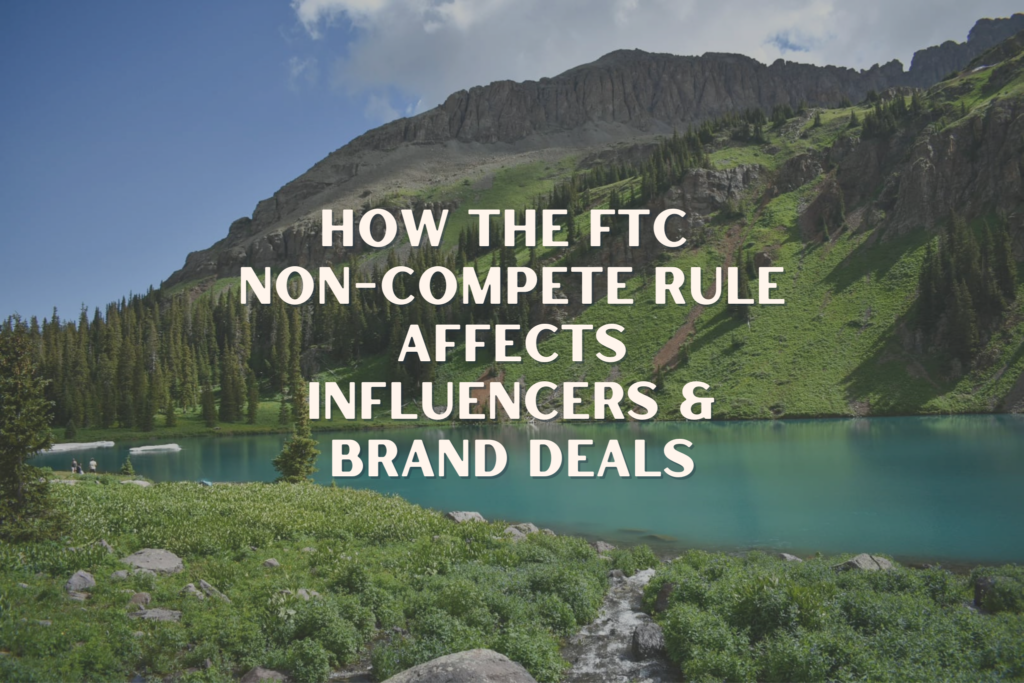The information contained in “How the FTC Non-Compete Rule Affects Influencers & Brand Deals“ is for informational and educational purposes only. It is not to be construed as legal advice. Reading this article or relying on information from this article does not ever create an attorney-client relationship between you and Katherine Jaquith (aka Kate Cooper). Please speak with a licensed attorney for individual advice.
*UPDATE* On August 20, 2024, a federal judge in Texas struck down the FTC’s non-compete rule, which means that it will no longer go into effect on September 4, 2024.
On April 23, 2024, the Federal Trade Commission (“FTC”) finalized a new rule under the FTC Act that bans the use of (most) non-compete clauses in employment contracts. This new rule has sent ripples across every industry in the United States, including advertising and influencer marketing. This article examines how the FTC non-compete rule affects influencers and brand deals.

Does the FTC Non-Compete Rule Apply to Influencers & Content Creators?
The new FTC non-compete rule bans non-compete clauses in employment contracts. Under the rule, a “non-compete clause” is any term or condition of employment that prohibits, penalizes, or functions to prevent a worker from either seeking or accepting work in the U.S. that begins after the conclusion of the employment or operating a business after the conclusion of the employment.
You can read the Final Rule HERE.
Influencers and content creators are independent contractors that are hired to perform work for brands. Independent contractors are explicitly considered workers under the FTC non-compete rule. The rule also defines employment as “work for a person,” which is very broad. While some people might think that influencers don’t actually work, they do, and the work they do qualifies them as workers under the new FTC rule. The rule also applies to agencies who hire influencers on behalf of brands.
Note: The rule only applies to influencers, creators, and other workers in the United States.
How Does the FTC Non-Compete Rule Affect Influencer Contracts?
The main way that the FTC non-compete rule affects influencer contracts is through exclusivity clauses. Depending on the terms, an exclusivity clause could be considered a non-compete clause under the new rule. At its core, an exclusivity clause prohibits an influencer from working with certain brands for a certain period of time. That period of time is now the most important piece of the puzzle when determining whether or not a particular exclusivity clause is considered a non-compete clause or not.
Remember, the FTC non-compete rule only applies to work that begins after the conclusion of the employment. So a brand can still include an exclusivity clause that runs while an influencer is working with the brand. However, extreme exclusivity clauses that restrict an influencer from working with other brands long after a partnership is over will no longer be permitted.
One question that remains is when is an influencer’s employment with a brand concluded? At the end of the contract term? After the brand’s usage rights to the influencer’s content terminate? After the influencer is paid for the last time? What if the influencer receives ongoing royalty payments? That could be a fun question for attorneys to mull over (I’d say the end of the contract term is the most reasonable way to determine when the employment is concluded).
Brand Deal Contract Terms to Know
Term of the Contract: How long the contract lasts (when it starts to when it ends).
Example: “The term of the contract will begin on the date that both parties sign the agreement and remain in effect through June 20, 2024.”
How Will the FTC Non-Compete Rule Impact Brand Deals?
This new restriction on non-compete clauses could have a few impacts on influencer brand deals. The best case scenario is that brands start opting for long-term partnerships with influencers to allow them to require exclusivity for longer periods of time. When structured strategically, long-term partnerships can benefit both brands and influencers.
The new FTC non-compete rule may also lead to brands creating unnecessarily long contract terms relative to the actual scope of a campaign to justify a longer exclusivity period. That’s something you may want to start keeping an eye out for when reviewing a brand deal contract.
One potential drawback from the FTC non-compete rule is that influencers may lose out on higher rates from longer exclusivity periods. Exclusivity is something that influencers charge extra for when working with brands because it means potential lost revenue. Limiting the period of time when an exclusivity clause can remain in effect limits how much influencers can charge for exclusivity.
However, I ultimately think this rule is a win for creators (and all workers in the U.S.). It provides leverage to negotiate longer term partnerships and makes a creator’s loyalty more valuable to brands. It also gives influencers freedom to move on from toxic brand partnerships without being tied to onerous exclusivity restrictions.

How Can Brands Protect Their Interests When Working With Influencers?
The FTC non-compete rule still allows for confidentiality and non-disclosure agreements. Brands can protect themselves by prohibiting influencers from sharing confidential information or trade secrets in a way that could benefit competitors.
However, brands should take case to ensure that any confidentiality or non-disclosure clause doesn’t “function to prevent” the influencer from working with other brands after the partnership is over. Otherwise, it might cross the line into the FTC’s definition of a non-compete clause.
As previously mentioned, brands can still include exclusivity provisions that are in effect while an influencer works with the brand. But those exclusivity restrictions need to end when the influencer stops working with the brand.
When Does the New Rule Go Into Effect?
*UPDATE: The FTC non-compete rule will no longer go into effect on September 4, 2024.*
The new FTC non-compete rule goes into effect on September 4, 2024. The rule also requires businesses to notify workers that existing non-compete clauses will not be enforced against them.
It’s important to note that the FTC non-compete rule is currently being challenged by the Chamber of Commerce and other groups. It’s possible that there will be a preliminary injunction or temporary restraining order that delays the effective date pending the outcome of the litigation.
The future of the FTC non-compete rule isn’t certain at this point, but it’s important that influencers and brands understand how it may impact them. The biggest impact is to exclusivity clauses in brand deal contracts that extend beyond an influencer’s work with a brand.
Pin It For Later:

View comments
+ Leave a comment